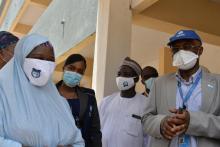Studying Nursing just got a lot easier”, says student nurse, College of Nursing and Midwifery, Maiduguri
Maiduguri, 24 September, 2020 - As part of its health system strengthening in the insurgency-affected states of Borno, Adamawa and Yobe states in the north-east Nigeria, World Health organization is touching millions of lives by rehabilitating, reconstructing or equipping health facilities and building the capacities of national health work-force.
Few weeks to her graduation from the Borno state College of Nursing and Midwifery in Maiduguri, Amina Waziri is confident that she would be providing urgently needed healthcare services, soon, to the teeming population of men, women and children in her state.
“Prior to WHO donations of equipment, books, laboratory apparatus, furniture and learning aids, among others, we struggled to theorize and memorize some procedures”, says Amina. “But today, studying nursing just got a lot easier and more interesting. I am not only confident that I can handle a good number of healthcare issues now, I am proud that my school has secured full accreditation of the Nursing Council of Nigeria. Thanks to WHO.”
Accreditation ensures the same standards and criteria across all nursing programmes in Nigeria irrespective of locations while ultimately improving the quality of nursing education and keeps the curriculum up to date on current trends in nursing and healthcare. Without full accreditation, a nursing school is limited to admitting a limited number of students and offering a handful of healthcare programmes.
With funding support from the EU, the College of Nursing and Midwifery, Maiduguri, has not only expanded its curriculum and enrolment capacity, it has improved its standard of teaching and learning. “In fact, in our last examination, 98% of our students scored 95% in nursing exams,” says the Provost of the College, Hajia Rukaiya Shettima.
During a recent visit to the college, WHO Representative to Nigeria, Dr Walter Kazadi Mulombo reiterated that WHO is committed to strengthening healthcare service delivery in north-east Nigeria. “With a view to providing urgently needed healthcare services to the people in need, WHO is committed to strengthening the health infrastructure, work-force and delivery systems in Borno, Adamawa and Yobe states. In these states, 11-year old insurgency has weakened the capacity of two-thirds of health facilities to respond to healthcare needs of the population.”
The college of nursing and midwifery, Maiduguri, which operated for nearly four decades without full accreditation is one of many healthcare facilities currently benefitting millions of people in need of healthcare as result of WHO donations of teaching aids and equipment.
In Yobe state, WHO-rehabilitated Kukar Gadu and Babangida health centres are currently providing healthcare services to over 35,000 persons within their catchment areas. Similar intervention in Adamawa state has also seen Kirya health facility, Hubare, Moni and Gudumiya health care centre reconstructed and upgraded by WHO to meet the increasing healthcare demands of populations affected by the insurgency.




